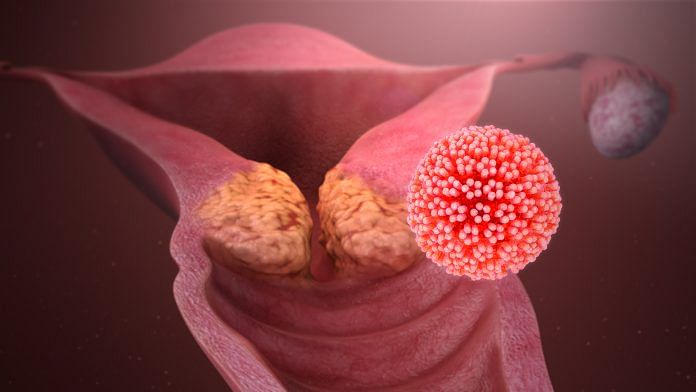New Delhi: Earlier this month, the central government announced its intention to encourage vaccination against the cervical cancer-causing Human Papillomavirus (HPV) among girls aged between 9 and 14 years.
“Our government will encourage vaccination for girls in the age group of 9 to 14 years for prevention of cervical cancer,” Finance Minister Nirmala Sitharaman said in her interim budget speech on 1 February.
HPV is a sexually transmitted infection that can cause several types of cancer including anal, cervical, oropharyngeal, penile, vaginal, and vulvar. It is shown to be behind 95 percent of cervical and uterine cancers that afflicted over 1.27 lakh women in 2022 and killed nearly 80,000, according to a World Health Organization (WHO) report released this month.
Although the Union government currently has no plans to include such a vaccine in its Universal Immunization Programme (UIP) anytime soon, the move is being seen as a step in the right direction.
Doctors and public health experts have frequently strongly endorsed the WHO’s recommendation that the HPV vaccine should be taken by girls before they are sexually active, saying that when this is given to girls aged 9-14 years, it’s nearly 99 percent efficacious.
However, health experts that ThePrint spoke to also call for making it part of the UIP, saying its inclusion is necessary for wider coverage.
Here’s a breakdown of the HPV vaccines that are available in India, how much they cost, and how effective they are.
Also Read: Breast cancer accounted for highest number of cancer fatalities in India in 2022, says WHO report
Available options
There are currently three vaccines against cervical cancer available in India: Cervarix from British pharmaceutical major GlaxoSmithKline (GSK), Gardasil 4 by MSD — the Indian arm of the US-based pharma company Merck — and the indigenous Cervavac, jointly developed by the Pune-based Serum Insititute of India (SII) and Union government’s department of biotechnology.
Cervarix from GSK is designed to prevent infection from HPV types 16 and 18. Although there are 14 different types of HPV linked with cervical cancers, types 16 and 18 cause about 70 percent of cervical cancer cases.
In addition, Cervarix has shown some cross-reactive protection against HPV virus strains 45 and 31 in clinical trials and also contains Adjuvant System 04 (A S04) — a type of adjuvant, an ingredient added in some vaccines to boost immune response, which helps the vaccine work for a longer period.
Available in India since 2008, Cervarix is prescribed for females from 10 to 45 years of age and its two doses are indicated 6-12 months apart. Each dose of this vaccine costs Rs 2,200-2,600.
Like Cervarix, Gardasil 4 by MSD, which was first launched in India in 2009, works against HPV types 16 and 18. But it also works against types 6 and 11.
A 2- or 3-dose schedule of this vaccine is recommended for women aged 9-45, either at 0-6 month intervals, or at 0, 2, and 6 months. Each dose costs Rs 3,500-4,000.
Another version of this vaccine, Gardasil 9 or Gardasil Nano, is effective against nine strains of HPV — types 6, 11, 16, 18, 31, 33, 45, 52, and 58. This is also the first gender-neutral HPV vaccine.
According to Merck, Gardasil 9 is recommended for females between 9 and 45 years to prevent cervical, vulvar, vaginal, anal, oropharyngeal, and other head and neck cancers caused by HPV.
For males, who can receive the vaccine between 9 and 15 years, it offers protection from precancerous or dysplastic lesions and genital warts. This vaccine is administered in either a 2-dose schedule (0, 6, or 12 months) or a 3-dose schedule (0,2, and 6 months).
However, Gardasil 9 is also the most expensive cervical cancer vaccine in the country, with each dose costing Rs 9,000-1000.
Cervavac, an indigenous cervical cancer vaccine developed by the central government and SII, has been available in India since last year. This is a quadrivalent vaccine, meaning that it is effective against four HPV types — 6, 11, 16 & 18.
Cervavac is prescribed for women between 9 and 26 years of age. There are two different doses — girls between 9 and 14 years are recommended a 2-dose schedule (at 0 and 6 months) while those between 15 and 26 years are prescribed a 3-dose schedule (at 0, 2, and 6 months). Every dose of this vaccine costs Rs 2,000.
Cervical cancer vaccine uptake in India
Although public health experts have been encouraging HPV vaccines for girls, only Sikkim offers it as part of its routine immunisation. While Delhi and Punjab, too, had started HPV vaccination of girls on a pilot basis in 2018, they did not include the vaccine in routine immunisation later.
The government does not maintain statistics on the uptake of the HPV vaccination in the private market. However, a first-of-its-kind community-based survey on usage and awareness about the vaccine in Delhi and Rohtak in 2022 showed that only 0.6 percent of 1,020 women who participated in the exercise had availed it.
“There is a considerable lack of knowledge about cervical cancer vaccine and practices towards vaccination among the women in these regions,” the researchers had noted then.
According to Dr Ravi Mehrotra, a cancer researcher who is also associated with the WHO’s International Agency for Cancer Research, while vaccines against cervical cancer have been available in India in the private market for over 10 years, the vaccine’s cost could probe to a “major limitation”.
Like many healthcare experts ThePrint previously talked to, Dr Mehrotra also believes that the government should consider including the HPV vaccine in its Universal Immunization Programme.
“It will dramatically increase the expansion of the vaccine’s coverage and will lead to a sharp fall in the burden of cervical cancers over the next few years,” he told ThePrint.
(Edited by Uttara Ramaswamy)



